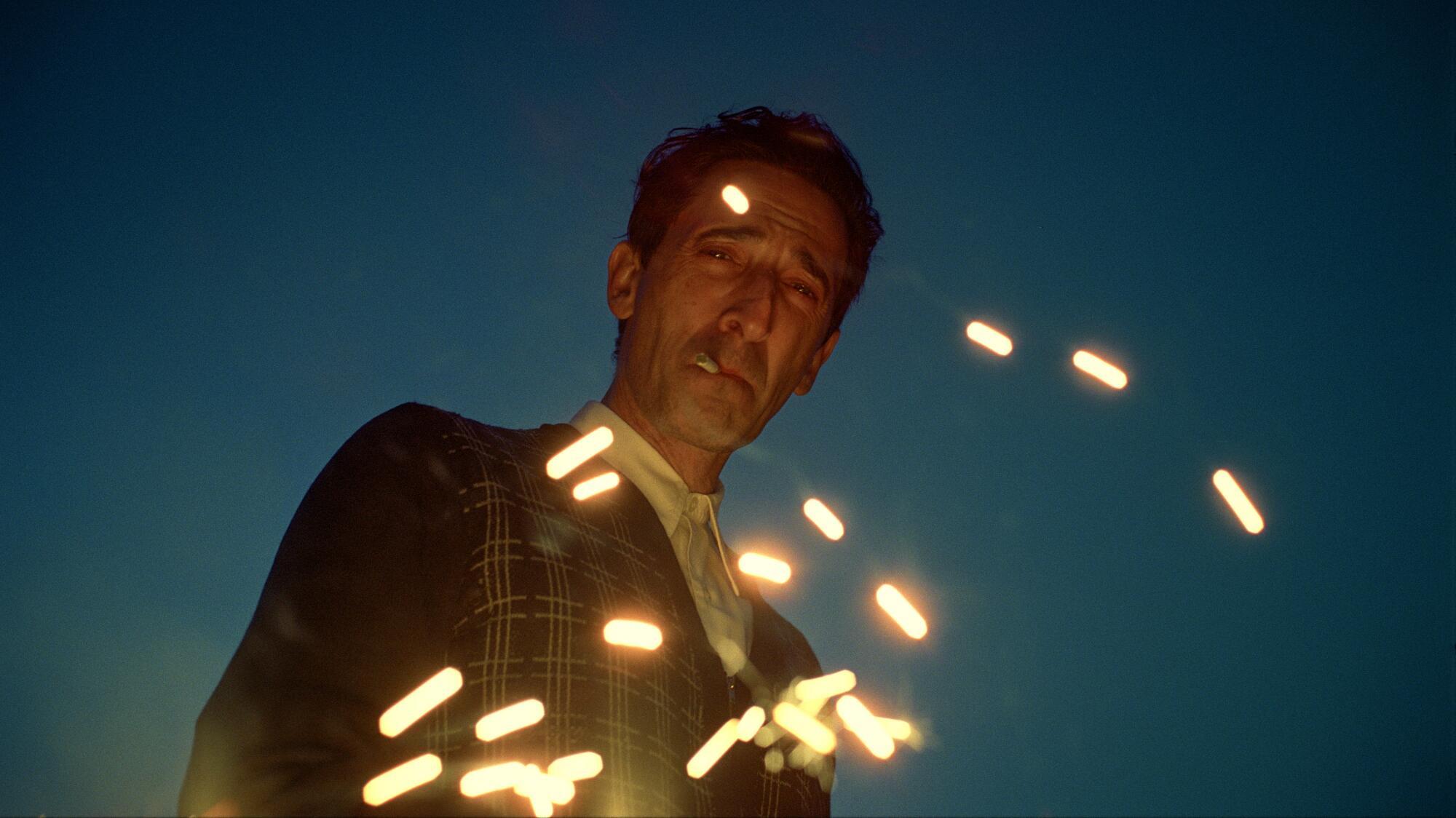From such Oscar winners as 1947’s “Gentleman’s Agreement,” 1959’s “The Diary of Anne Frank” and 1965’s “The Shop on Main Street” to latter-day titles together with “Schindler’s List,” “The Pianist” and “A Serious Man,” Jewish-themed movies have lengthy loved a key area of interest within the awards circle.
As evidenced by this record, Holocaust-era dramas typically have competed for the gold, however different sorts of films with integrally Jewish lead characters and conditions — comparable to “Funny Girl,” “Fiddler on the Roof,” “Call Me by Your Name” and “The Fabelmans” — even have made their mark round Oscar season.
This 12 months, there was a very big range of options highlighting the Jewish expertise — each fact-based and fictionalized — which might be prone to be middle stage come awards time. They usually have arrived at an important second in Jewish historical past after final 12 months’s Oct. 7 assault by Hamas on Israel, elevated considerations about antisemitism worldwide and, because of this, a renewed sense of Jewish delight.
To that finish, there’s a “never forget” side to most of the movies on this present trove. Such traditionally impressed items as “The Brutalist,” “Lee,” “White Bird: A Wonder Story” and the documentaries “The Commandant’s Shadow” and “Riefenstahl,” plus the modern dramedy “A Real Pain,” all characteristic echoes of the Shoah. Then there’s “September 5,” which returns us to the deadly assault on Israeli group members by Palestinian terrorists on the 1972 Munich Summer season Olympics.
On a lighter notice, there’s the odd-couple comedy “Between the Temples,” the nonagenarian-grandma caper “Thelma” and the documentary about Jewish comedian actor “Remembering Gene Wilder.” One might even depend “A Complete Unknown,” the biopic of music legend (and briefly lapsed Jew) Bob Dylan, as a member of this total group.
Even when this surge of Jewish-oriented footage may be extra coincidence than full-fledged cinematic motion, the query stays: Why now, and the place do these movies match into the zeitgeist?
The filmmaker provides, “But I’m also not blind to the current moment — where a lot of American Jews are dealing with very conflicted feelings about global events, their own identity, and experiencing greater attention and scrutiny.”
In consequence, viewing the movie takes on a particular resonance, as does “Remembering Gene Wilder,” which screened in festivals and, later, theatrically after the onset of the Israel-Hamas battle.
That film’s author, Glenn Kirschbaum, remembers, “As we began putting the film together, it became increasingly clear that there were many Jewish themes that ran through it. Then, the events of October 7 took place, and the film became more meaningful to all of us.” He continues, “We came to see it as a source of laughter in a time of great sorrow. And a tribute to a positive and much-loved Jewish personality in a time of ever-increasing antisemitism.”
Ron Frank, the documentary’s director, says, “Films and TV have always had a special responsibility in portraying Jewish themes and history.” He provides, “Considering the centuries of antisemitism we’ve endured, it makes sense to tell our stories and have them seen and heard to educate and inform in an attempt to reverse ignorance and hate.”
Carol Kane, Oscar-nominated for her efficiency in Joan Micklin Silver’s 1975 Jewish immigrant story “Hester Street” and co-star (as a late-blooming bat mitzvah pupil) of 2024’s “Between the Temples,” believes that presenting characters in Jewish-centric films with individuality can be vital.
“The more the characters involved in the stories are explored in some depth in regards to their uniqueness, and not in a kind of cliched definition or portrayal, [helps],” the actor says in a latest cellphone chat. “Each Jewish person is as different as each person of any faith — or persons out of faith.”
Relating to the present wealth of Jewish-themed movies, she provides, “There might be some underlying need right now to step up and be counted.”
Right here’s a better have a look at three of this season’s main award-worthy movies and their connections to Judaism and Jewish historical past:
Adrien Brody in “The Brutalist.”
(A24)
“The Brutalist”: Director and co-writer Brady Corbet’s epic have a look at Jewish emigration and assimilation stars Oscar winner Adrien Brody (“The Pianist”) as László Tóth, a Hungarian Jewish architect and Holocaust survivor who involves the U.S. in 1947 in quest of the American Dream. Man Pearce co-stars as a mysterious, antisemitic industrialist who modifications the bold László’s life; Felicity Jones performs László’s resilient spouse. The acclaimed movie’s stirring Yom Kippur scene has been in comparison with the long-lasting baptism sequence in “The Godfather.”

Kieran Culkin and Jesse Eisenberg star in “A Real Pain.”
(Sundance Institute)
“A Real Pain”: Author-director Jesse Eisenberg and Kieran Culkin, in maybe career-best performances, play mismatched Jewish cousins whose push-pull dynamic performs out in each humorous and affecting methods as they journey to Poland to go to the childhood house of their beloved late grandmother, a Holocaust survivor. The movie, which features a wrenching go to to the Majdanek focus camp, is deftly peppered with insightful strands of Jewish historical past and tradition.

Peter Sarsgaard, left, within the film “September 5.”
(Jurgen Olczyk)
“September 5”: Although it’s not the primary movie to revisit the hostage disaster on the 1972 Summer season Olympic Video games (Steven Spielberg’s “Munich” and Kevin MacDonald’s “One Day in September” had been each lauded portraits), director and co-writer Tim Fehlbaum’s new take is a propulsive, behind-the-scenes have a look at the ABC Sports activities group and its landmark stay protection of the Munich bloodbath. The continued Israel-Hamas battle makes this film regrettably well timed.




